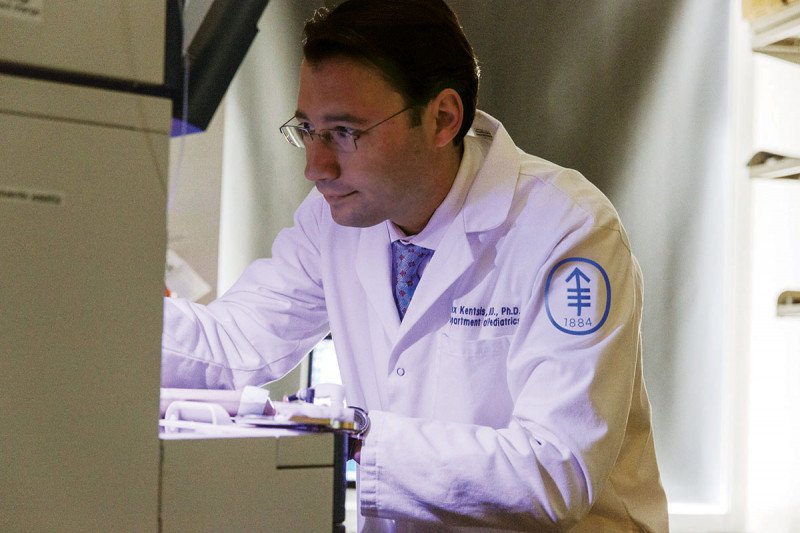
Physician-scientist Alex Kentsis studies how genetic changes lead to cancer in children.
A study exploring the genetic landscape of leukemia in children has discovered that the kinds of mutations behind certain pediatric blood cancers are different from those that trigger leukemia in adults.
The genetic changes the researchers found help explain why some pediatric leukemias are so difficult to treat. They also suggest new approaches for more-accurate diagnosis and better therapies. The multicenter study was co-led by Memorial Sloan Kettering physician-scientist Alex Kentsis and published in the journal Leukemia. The first authors were MSK investigators Nicole McNeer and John Philip.
“The types of mutations that we saw implicate an entirely different set of genetic causes for blood cancer in children compared with adults,” says Dr. Kentsis, a pediatric oncologist who also leads a lab in the Sloan Kettering Institute’s Molecular Pharmacology Program. In adults, he explains, the most common mutations are relatively simple changes in the genetic code, called point mutations. In children, the genetic changes involve much more complicated rearrangements of the DNA.
New Findings about the Causes of Pediatric Leukemia
In the study, the researchers analyzed cancer cells from 28 children who had a form of acute myeloid leukemia (AML) that’s resistant to chemotherapy. About half of children with more-aggressive subtypes of AML eventually die from the disease.
The investigators set out to determine why this cancer is so difficult to treat. The ultimate goal is to develop new targeted therapies that will work better than existing treatments and have fewer side effects than chemotherapy.
“Our findings were very much in agreement with the emerging understanding that children develop cancer through an entirely different set of causes than adults do,” Dr. Kentsis says. “We think these findings apply to all leukemias, not just AML subtypes.”
What Happens When a Normal Process Goes Wrong
In adults, the majority of cancer is caused by aging and exposure to environmental factors that disrupt DNA. The causes of cancer in children can be very different, however. Most young people have not had time to accumulate these kinds of mutations or damage from exposures, such as to UV light. (The exception is children who have been exposed to radiation or chemotherapy as treatment for another cancer. This can sometimes cause pediatric AML.)
Instead, the investigators believe that the kinds of large-scale errors seen in these pediatric leukemias result from built-in defects in the DNA’s stability in developing cells. For example, a maturing immune system needs to make antibodies. These proteins help the immune system learn to recognize foreign substances. Rearranging the DNA is an important part of normal antibody production. “But for reasons we don’t yet fully understand, rearrangements that are normally required for immune function can sometimes be abnormally activated in developing blood cells. This can result in the formation of cancer-causing genes and ultimately blood cancers,” Dr. Kentsis says.
“We found that these pediatric leukemias have extensive changes in their DNA that lead to the production of fusion genes, complex deletions, and translocations — where pieces of DNA get moved around,” he adds. Previous research from Dr. Kentsis’s lab looked at the role of similar genome rearrangements in many types of solid tumors in children.
“Based on this research and many other efforts across the world, we at MSK are now incorporating genetic tests to look for these kinds of errors in all our pediatric patients,” Dr. Kentsis concludes. “We’ll use this new information to develop targeted therapies that are tailored to individuals’ specific tumors to ultimately provide therapies that are precise, curative, and safe.”





